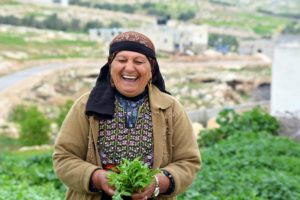Women Can: Economic Empowerment in the West Bank

March 20, 2019 | Washington, DC Women-headed families in the West Bank are especially vulnerable to economic deprivation and social marginalization. Only 18 percent of women in Palestine participate in the workforce, among the lowest in the region. With financial support from Islamic Relief USA (IRUSA), Anera has begun a project to empower Palestinian women who are the heads of their households to increase their economic autonomy and the financial resources of themselves and their families.
The program, called Women Can, will enable 100 Palestinian women in the West Bank to start or develop small enterprises and will support them through training, seed funding, mentorship, and other capacity-building activities. The project, which began this month and runs through February 2020, targets poor communities in the Nablus and Qalqilia areas, with a focus on women-headed families with orphan children. Anera estimates there will be at least 500 additional people who benefit indirectly, most of them children. By targeting women-headed families, the indirect positive impacts of this project will be substantial, improving the well-being of 100 marginalized households across the West Bank.
Nariman Othman, Anera’s education program coordinator, connects Women Can to her own personal experiences,
“Being a single mother responsible for four children, I have confronted both the challenges presented by how our culture treats single women, and the economic responsibility to provide for my family without any support. Women feel more confident and resilient when we are supported by others…That’s what Anera is trying to do here in working with these 100 women to help them to be economically independent. I know very well the impact such a project can have and what it means for deprived women.”
Women-headed families make up 12 percent of households in the West Bank, and are identified as being among the most vulnerable groups in Palestine. Supporting women to generate their own income is the most reliable strategy for enhancing resilience. Anera aims to help boost the income generated from each participant’s small enterprise to equal at least the Palestinian national minimum wage (about $430 per month).
According to the Palestinian Central Bureau of Statistics, 87 percent of women heads of household are not earning an income, explaining the high poverty rates in these families. As too often happens in conflict zones, the death, separation from, or imprisonment of male adult relatives – fathers, husbands, adult male children – forces the burden of caring for the needs of the entire family onto women. Food insecurity is a major concern for these families. In the West Bank, a full quarter of all women-headed families are food-insecure.
Anera is partnering with the Ministry of Social Development, the Ministry of Agriculture, and local civil society organizations to identify low-income Palestinian women, prioritizing female-headed households with orphan children. The project will focus on fostering the development of small businesses in agriculture and other sectors.
Project participants will each receive 28 hours of training tailored to their specific sector and business needs. Training will be divided into two stages: first, participants will learn business and management basics, including topics such as business planning, budgeting, marketing, price setting, etc. The second phase of training will focus on the technical skills required for each type of business. For example, if the enterprise is a food processing business, then the participant would learn how to select, process, and safely can/bottle products for sale. For established businesses, branding and marketing will be especially critical.
Anera will provide transportation for each training session, ensuring the women’s participation by removing a key barrier to success common to women-centered programming. Anera will also be mindful of childcare needs and scheduling as part of its gender-sensitive approach.
Once training is complete, Anera will contract local suppliers, and procure and help install the equipment required for each enterprise. Anera will continue to assist each beneficiary once their enterprise is launched by providing ongoing mentoring from technical specialists. This coaching and mentoring will provide important guidance to help beneficiaries develop, sustain, and scale their businesses.
For more information, please contact:
Steven Fake
Media Relations Officer, Anera
202.266.9719
[email protected]
About Anera
For over 50 years, Anera has helped refugees and others hurt by conflicts in the Middle East live with dignity and purpose. Anera, which has no political or religious affiliation, works on the ground with partners in the West Bank, Gaza, East Jerusalem, Lebanon, and Jordan. We mobilize resources for immediate humanitarian relief and for sustainable health, education, and economic development efforts. Our staff are from the communities they serve, navigating the politics that constrict progress to get help where it’s needed most. In this way, Anera has grown to deliver more than $65 million in programming annually. We will keep building better lives until hope finds its way in the Middle East.
This project is being implemented with the generous support of the Islamic Relief USA. The views expressed herein are those of American Near East Refugee Aid (Anera) and shall not, in any way whatsoever, be construed to reflect the official opinion of IRUSA, its Islamic Relief affiliates, or its donors.
